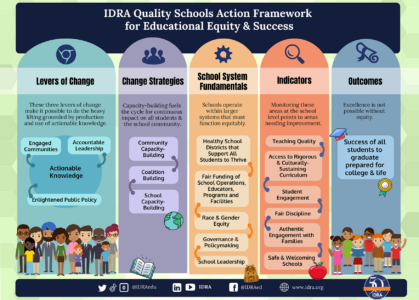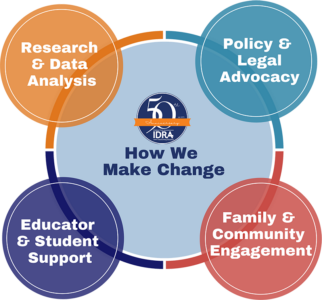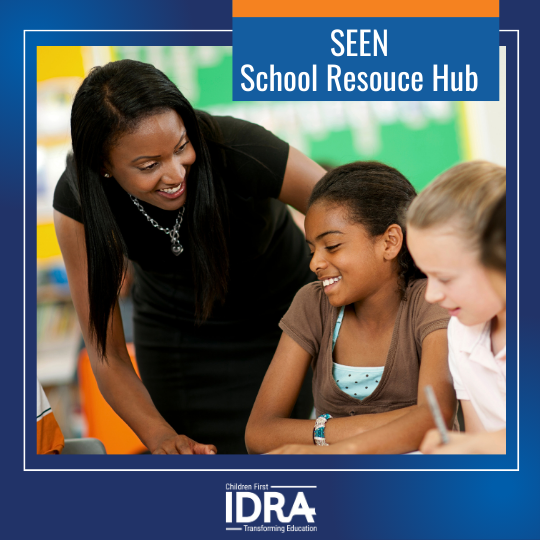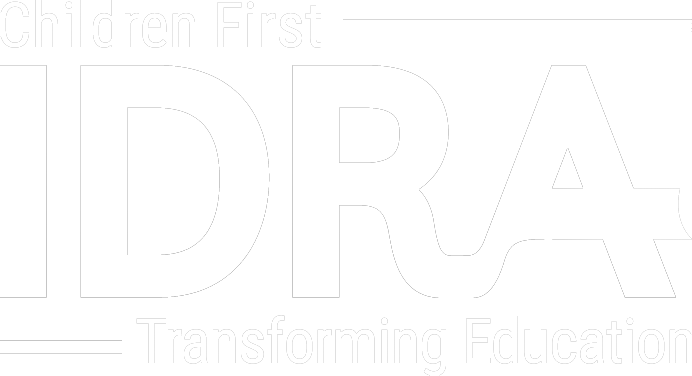• By Celina Moreno, J.D., María “Cuca” Robledo Montecel, Ph.D., Aurelio M. Montemayor, M.Ed. • IDRA Newsletter • April 2023 •
 As IDRA turns 50, we celebrate past wins in pursuit of education justice and recommit to our work to secure a high-quality education for all as an essential element of U.S. democracy and the common good. In doing so, we choose radical hope and bridge-building, not fear and division. And we stay nimble to innovate for stronger public schools that nourish all students.
As IDRA turns 50, we celebrate past wins in pursuit of education justice and recommit to our work to secure a high-quality education for all as an essential element of U.S. democracy and the common good. In doing so, we choose radical hope and bridge-building, not fear and division. And we stay nimble to innovate for stronger public schools that nourish all students.
As an impact-focused organization, IDRA has provided expert testimony in key high court cases; published seminal research on Texas student attrition; developed groundbreaking bilingual legislation and early childhood curriculum and materials; modeled effective professional development; organized and led education coalitions, and innovated student leadership and authentic family engagement programs.
While many non-profits weaken or disappear within five years or upon the retirement of their founders, IDRA not only continued its existence but expanded its advocacy work and solidified its economic base and litigation support; policy advocacy reach; coalition building; and educator, school and community training and technical assistance.
From the founder, Dr. José A. Cárdenas, to IDRA’s subsequent CEOs, Dr. María “Cuca” Robledo Montecel and Celina Moreno, J.D., IDRA has had elegant transitions and continuations of leadership, persistence and growth. And their success has always stemmed from an intergenerational, multi-disciplinary skilled and dedicated staff.
Originally created in 1973 as Texans for Educational Excellence and focused on informing the state about the inequitable funding of public schools, IDRA’s path soon widened beyond a single state. IDRA grew from information sharing to transforming all aspects of public schools, especially for students who are of color, emergent bilingual, recent immigrant, and in families with low incomes, among other underserved populations.
Courage to Connect
 In 2010, IDRA published Courage to Connect: A Quality Schools Action Framework and introduced its change model (Robledo Montecel & Goodman, 2010). That model draws on experience and empirical evidence for assessing a school’s conditions and outcomes, identifying leverage points for improvement, and informing action.
In 2010, IDRA published Courage to Connect: A Quality Schools Action Framework and introduced its change model (Robledo Montecel & Goodman, 2010). That model draws on experience and empirical evidence for assessing a school’s conditions and outcomes, identifying leverage points for improvement, and informing action.
We know from research and experience that students are far more likely to succeed when they have the chance to work with highly qualified, committed teachers using effective, accessible curricula when schools authentically engage families, communities and, especially, students in their learning. Enlightened public policy, engaged citizens and accountable leadership leverage change. Change is built through schools, communities and coalitions. (Robledo Montecel & Montemayor, 2018c)
Bridging Policy, Practice and Research
 IDRA is unique in that it bridges education practice, research and legal and policy advocacy (Robledo Montecel & Montemayor, 2018a). Informed by the communities that IDRA serves, we:
IDRA is unique in that it bridges education practice, research and legal and policy advocacy (Robledo Montecel & Montemayor, 2018a). Informed by the communities that IDRA serves, we:
- Support and amplify the voices of students and families most impacted by education policy and practice.
- Establish partnerships with researchers, policymakers, civil rights lawyers and educators to ensure that each group can work together to promote evidence-based policies and practices.
- Foster communication among researchers, policymakers and educators to ensure that research findings are accessible to and actionable for all stakeholders.
- Conduct actionable research to identify solutions and inform policy and practice decisions.
- Disseminate research findings to educators, policymakers and the public to ensure that data are accessible and usable by all stakeholders.
- Advocate evidence-based policies supportive of students of color, families with low incomes, and recent immigrant families and work to educate policymakers and the public about the importance of evidence-based policymaking.
- Provide training to educators and policymakers on how to use research to inform their practices and policy decisions.
- Monitor and evaluate policies and practices to ensure that they are achieving the intended outcomes.
Our work to increase school holding power illustrates the work of bridging and connecting. IDRA conducted the Texas School Survey Project in 1986. It was the first statewide research study on dropouts and was commissioned by the Texas Department of Commerce and the Texas Education Agency.
That 1986 research found that 86,276 Texas students dropped out that year without completing high school at a cost of $17 billion to the state. This research resulted in Texas House Bill 1010 that defined the term dropouts, mandated dropout counting and reporting, and funded dropout prevention programs and staff across the state.
IDRA’s cumulative annual studies since then show that a total of 41 million students have been lost to schools’ weak holding power in Texas. Our initial research also pointed to the prevalence of deficit-based programs in the few (nine) that existed.
Based on our research findings and school innovation, IDRA created a program, the Valued Youth Partnership, for secondary school students that is asset-based, focusing on those students who are considered potential dropouts. Over 40 years, 35,000 valued youth tutors in the United States and Puerto Rico, England and Brazil have participated in this award-winning program. The lives of more than 730,000 children, families and educators have been positively impacted by the program.
The program engages the student as tutor of little ones, brings in families and communities, supports teacher initiative and builds the capacity of the school to hold on to students until high school graduation (Robledo Montecel & Montemayor, 2018b). (Learn more about the IDRA Valued Youth Partnership.)
Leading the Learning
At our core, we know that what we envision can happen. In fact, it is happening. Our vision is built on the recognition that each person has agency and value. When we bring people together to transform educational policy and practice, we do so using four fundamental evidence-based approaches.
Paulo Freire’s conscientization emphasizes the importance of critical thinking and awareness of social and political issues in education (1998). It encourages learners to analyze their own experiences and the world around them in order to understand the systemic injustices that exist and work toward social change.
Malcolm Knowles’ andragogy is centered on the idea that adult learners have unique needs and characteristics, such as a desire for self-direction and relevance in their learning (Bouchrika 2021). It emphasizes the importance of creating a supportive and collaborative learning environment, where learners can take ownership of their learning and apply new knowledge to their own lives and contexts.
Group dynamics recognizes that learning is a social process and that each can benefit from working collaboratively with others. It emphasizes the importance of creating a positive group dynamic, where learners feel comfortable sharing ideas and taking risks and where different perspectives and experiences are valued.
The facilitation approach focuses on the role of the facilitator in guiding and supporting the learning process. It emphasizes the importance of creating a safe and inclusive learning environment where learners feel supported and encouraged to participate actively in their own learning.
By incorporating these four into our training, policy and programmatic work, we create effective and equitable experiences for all learners and advocates, with a particular focus on historically marginalized groups. Whether with teachers in professional development to serve emergent bilingual students or parents engaged in IDRA Education CAFE activities to strengthen their schools, IDRA has drawn on those approaches for five decades.
As we look ahead to our next decade, we will continue to build bridges across cultures, races, languages, generations and disciplines to ensure that all students receive an excellent education that does not require them to leave their identities at home to reach their highest potential and determine their own futures.
Resources
Bouchrika, I. (January 24, 2021). The Andragogy Approach: Knowles’ Adult Learning Theory Principles. Research.com
Freire, P. (1998). Pedagogy of Freedom: Ethics, Democracy, and Civic Courage. Rowman & Littlefield Publishers.
Montemayor, A.M., & García, T.R. (2022). The Dialogical Journey of Aurelio Manuel Montemayor, in Kress, T., Stein, E., & Lake, B. (Eds) Radically Dreaming: Illuminating Freirean Praxis in Turbulent Times. DIO Press.
Robledo Montecel, M., & Goodman, C. (2010). Courage to Connect: A Quality Schools Action Framework. IDRA.
Robledo Montecel, M., & Montemayor, A.M. (June-July 2018a). Beginning with the End in Mind to Establish Equitable, Excellent Education. IDRA Newsletter.
Robledo Montecel, M., & Montemayor, A.M. (June-July 2018b). Valuing Youth and Assuring that All Youth Count. IDRA Newsletter.
Robledo Montecel, M., & Montemayor, A.M. (June-July 2018c). InterAction with the Ecosystem – The IDRA Quality Schools Action Framework. IDRA Newsletter.
Celina Moreno, J.D., is President & CEO of IDRA. Comments and questions may be directed to her via email at contact@idra.org. María “Cuca” Robledo Montecel, Ph.D., is president emerita of the IDRA. Comments and questions may be directed to her via email at contact@idra.org. Aurelio M. Montemayor, M.Ed., is IDRA’s family engagement coordinator and directs IDRA Education CAFE work. Comments and questions may be directed to him via email at aurelio.montemayor@idra.org.
[©2023, IDRA. This article originally appeared in the April 2023 IDRA Newsletter by the Intercultural Development Research Association. Permission to reproduce this article is granted provided the article is reprinted in its entirety and proper credit is given to IDRA and the author.]


